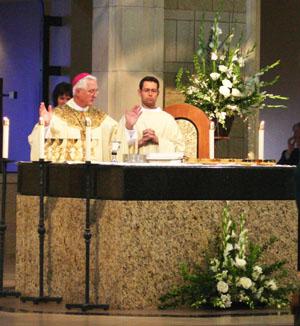
By Deacon Frank Agnoli
In this article, we continue our walk through the Liturgy of the Eucharist.
All our Eucharistic Prayers have been retranslated; the new texts are available for viewing at www.usccb.org/romanmissal/resources.shtml.
Probably the change that has received the most attention has been the translation of the Latin phrase, pro multis.
Currently, we hear in the Eucharistic Prayers that Christ’s blood “will be shed for you and for all so that sins may be forgiven.” The new translation will read: “which will be poured out for you and for many, for the forgiveness of sins.”
OK, first of all: what does this change not mean? It does not mean that Christ did not die for everyone. The Scriptures (for example, John 11:52; 2 Corinthians 5:14-15; Titus 2:11; 1 John 2:2) and the dogmatic teaching of the Church (Catechism §§624, 629) make it clear that Christ died for everyone. In addition, in our Eucharistic Prayers, we pray that all the dead (not just Catholics and other Christians) would enjoy eternal life.
Then, why the change?
First, for scriptural reasons: The words in our Eucharistic Prayer come from the Gospels of Matthew (26:28) and Mark (14:24); the Greek for “many” is used there and connects to Isaiah 53:11-12.
Second, for historical reasons: The Roman Rite has always said pro multis (for many) and not pro omnibus (for all) at this point in the Mass.
Third, for ecumenical reasons: The Eucharistic Prayers of the Eastern Churches all have “for many” in their respective languages.
Finally, for theological reasons: As Cardinal Francis Arinze, former prefect of the Congregation for Divine Worship and Discipline of the Sacraments, stated in his letter to presidents of conferences of bishops (Oct. 17, 2006):
The expression “for many,” while remaining open to the inclusion of each human person, is reflective also of the fact that this salvation is not brought about in some mechanistic way, without one’s own willing or participation; rather, the believer is invited to accept in faith the gift that is being offered and to receive the supernatural life that is given to those who participate in this mystery, living it out in their lives as well so as to be numbered among the “many” to whom the text refers.
In other words, while salvation is offered to all, not all will accept God’s gift. Respecting human free will means that we need to accept the possibility that some might reject God, and our prayer — rather than being a denial of God’s mercy — is instead a profound acknowledgment of the degree to which God will go to respect our freedom.
For more information, please see the U.S. bishops’ Web site at http://www.usccb.org/romanmissal/translating_sixquestions.shtml.
(Deacon Agnoli is director of liturgy for the Diocese of Davenport.)








